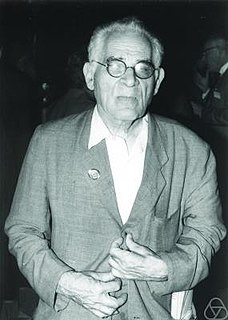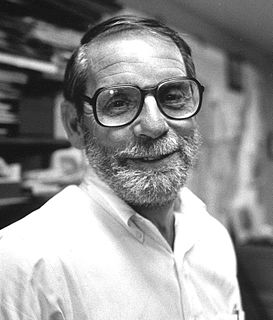Top 682 Initial Quotes & Sayings - Page 12
Explore popular Initial quotes.
Last updated on April 19, 2025.
The real truth - like anything, you have an idea about something you might write and it changes. People reflect on it or you get other ideas and maybe your original idea is radically different than how it ends up being. It's not a theorem. You don't sit down and prove something. You start with an initial idea and it grows and grows. The math of the narrative changes. In some ways your original document and what the film ends up being are quite different.
Code wants to be simple... I had to give up the idea that I had the perfect vision of the system to which the system had to conform. Instead, I had to accept that I was only the vehicle for the system expressing its own desire for simplicity. My vision could shape initial direction, and my attention to the desires of the code could affect how quickly and how well the system found its desired shape, but the system is riding me much more than I am riding the system.
Historically, measures initially directed at foreign nationals have subsequently been extended to citizens. What happens is foreign nationals are the easiest targets and most vulnerable targets, so they're the initial targets. But government officials, once you give them a certain kind of power over individuals, they get used to it and almost inevitably seek out ways to extend it. You will see that virtually every form of repressive government measure that has been employed in the United States against citizens started out as an antialien measure and was then extended to citizens.
The reality is that the founding fathers were land speculators. The fact was that you couldn't vote in this country if you did not own land, and that was basically you had to be a white man who owned land. Now how did they get that land? They basically had to steal it from someone, and that would be probably the Indians. And so most of the initial founding fathers were, while they may have had some really nice ideas about democracy, they had a lot of issues with people of color. They had a lot of issues with people who held things that they coveted.
Do you think it interests me that this painting represents two figures? These two figures existed, they exist no more. The sight of them gave me an initial emotion, little by little their real presence grew indistinct they became a fiction for me, then they disappeared, or rather, were turned into problems of all kinds. For me they are no longer two figures but shapes and colours, don't misunderstand me, shapes and colours, though, that sum up the idea of the two figures and preserve the vibration of their existence.
What first truly stirred my soul was not fear or pain, nor was it pleasure or games; it was the yearning for freedom. I had to gain freedom-but from what, from whom? Little by little, in the course of time, I mounted freedom's rough unaccommodating ascent. To gain freedom first of all from the Turk, that was the initial step; after that, later, this new struggle began: to gain freedom from the inner Turk-from ignorance, malice and envy, from fear and laziness, from dazzling false ideas; and finally from idols, all of them, even the most revered and beloved.
Once, at a seminar, I heard a Westernized lama say that a meditator's state of mind should be like that of a hotel doorman. A doorman lets the guests in, but he doesn't follow them up to their rooms. He lets them out, but he doesn't walk into the street with them to their next appointment. He greets them all, then lets them go on about their business. Meditation is, in its initial stages, simply accustoming oneself to letting thoughts come and go without grasping at their sleeves or putting up a velvet rope to keep them out.
The usual method of creation for most human beings is a three-step process involving thought, word, and deed or action. First comes thought; the formative idea; the initial concept. Then comes the word. Most thoughts ultimately form themselves into words, which are often then written or spoken. This gives added energy to the thought, pushing it out into the world, where it can be noticed by others. Finally, in some cases words are put into action, and you have what you call a result; a physical world manifestation of what all started with a thought.
The thing is, autism is all different, you know, variables. And you start out with a certain amount of, you know, the point where the differences in the brain are going to just be a personality variant and, like, for very mild Asperger's. But you get into more severe kinds of autism where there's obvious speech delay, obvious abnormal behavior in a two and three-year-old child, you know, the initial neurology is different from case to case. But all children with autism are going to do better if they get really good educational intervention.
Of course I constantly despair at my own incapacity, at the impossibility of ever accomplishing anything, of painting a valid, true picture or even knowing what such a thing ought to look like. But then I always have the hope that, if I persevere, it might one day happen. And this hope is nurtured every time something appears, a scattered, partial, initial hint of something which reminds me of what I long for, or which conveys a hint of it – although often enough I have been fooled by a momentary glimpse that then vanishes, leaving behind only the usual thing.
Upon its debut, The Room was a spectacular bomb, pulling in all of $1,800 during its initial two-week Los Angeles run. It wasn't until the last weekend of the film's short release that the seeds of its eventual cultural salvation were planted. While passing a movie theater, two young film students named Michael Rousselet and Scott Gairdner noticed a sign on the ticket booth that read: NO REFUNDS. Below the sign was this blurb from a review: “Watching this film is like getting stabbed in the head.” They were sold.
You may not realize initially how many other opportunities are wrapped up inside the first one. After you go through the first door, you'll then discover more doors automatically opening behind that one. One door leads you to another door, which leads to another door, and so one. It's like ten other boxes packed inside one box. The initial door that God opens is your access to more opportunities. But you must be willing to walk through the first one to get to the other good things God has for you.
My husband, William Sutcliffe, the writer, is my first reader and in many ways my most important. That initial reading of the manuscript is crucial and irreplaceable and you want them to approach it as someone in a bookshop might, not knowing much about it. So I've got into this pattern of not telling Will anything about the book I'm working on. He often knows nothing about the book I'm working on at all until I give him the whole manuscript and ask him to read it. The book I'm working on at the moment he knows nothing about. No one does.
I have a great editor and I enjoy, in a masochistic way, being ruthless about my own performance. How do I know, but I think I'm quite good at saying, "That's no good. That's no good. That's it. That's it. That's good." And I'm with the editor who goes, "No, I think you're wrong. That's not your best." There's an initial point in the editing, if you're directing yourself, especially in my case, where you go, "Ouch, ouch, ouch, I can't watch this." And then, there's a point where you become hard-nosed and just take your neurosis away and go, "What's working? That's okay. That's okay. We can lose that, and lose that." You get objective about it.
Our initial sensory data are always "first derivatives," statements about differences which exist among external objects or statements about changes which occur either in them or in our relationship to them. Objects and circumstances which remain absolutely constant relative to the observer, unchanged either by his own movement or by external events, are in general difficult and perhaps always impossible to perceive. What we perceive easily is difference and change and difference is a relationship.
As a newborn baby breathes and cries, so the signs of life in a newborn Christian are faith and repentance, inhaling the love of God and exhaling an initial cry of distress. And at that point what God provides, exactly as for a newborn infant, is the comfort, protection, and nurturing promise of a mother. "If God is our father, the church is our mother." The words are those of the Swiss Reformer John Calvin ... it is as impossible, unnecessary, and undesirable to be a Christian all by yourself as it is to be a newborn baby all by yourself.
To achieve accurate knowledge of others, if such a thing were possible, we could only ever arrive at it through the slow and unsure recognition of our own initial optical inaccuracies. However, such knowledge is not possible: for, while our vision of others is being adjusted, they, who are not made of mere brute matter, are also changing; we think we have managed to see them more clearly, but they shift; and when we believe we have them fully in focus, it is merely our older images of them that we have clarified, but which are themselves already out of date.
When discouraged some people will give up, give in or give out far too early. They blame their problems on difficult situations, unreasonable people or their own inabilities. When discouraged other people will push back that first impulse to quit, push down their initial fear, push through feelings of helplessness and push ahead. They're less likely to find something to blame and more likely to find a way through.
Mathematical study and research are very suggestive of mountaineering. Whymper made several efforts before he climbed the Matterhorn in the 1860's and even then it cost the life of four of his party. Now, however, any tourist can be hauled up for a small cost, and perhaps does not appreciate the difficulty of the original ascent. So in mathematics, it may be found hard to realise the great initial difficulty of making a little step which now seems so natural and obvious, and it may not be surprising if such a step has been found and lost again.
I don't know if you've ever noticed this, but first impressions are often entirely wrong. You can look at a painting for the first time, for example, and not like it at all, but after looking at it a little longer you may find it very pleasing. The first time you try Gorgonzola cheese you may find it too strong, but when you are older you may want to eat nothing but Gorgonzola cheese. Klaus, when Sunny was born, did not like her at all, but by the time she was six weeks old the two of them were thick as thieves. Your initial opinion on just about anything may change over time.
A quarter-horse jockey learns to think of a twenty-second race as if it were occurring across twenty minutes--in distinct parts, spaced in his consciousness. Each nuance of the ride comes to him as he builds his race. If you can do the opposite with deep time, living in it and thinking in it until the large numbers settle into place, you can sense how swiftly the initial earth packed itself together, how swiftly continents have assembled and come apart, how far and rapidly continents travel, how quickly mountains rise and how quickly they disintegrate and disappear.
My father was a writer, so I grew up writing and reading and I was really encouraged by him. I had some sort of gift and when it came time to try to find a publisher I had a little bit of an "in" because I had his agent I could turn to, to at least read my initial offerings when I was about 20. But the only problem was that they were just awful, they were just terrible stories and my agent, who ended up being my agent, was very, very sweet about it, but it took about four years until I actually had something worth trying to sell.





















